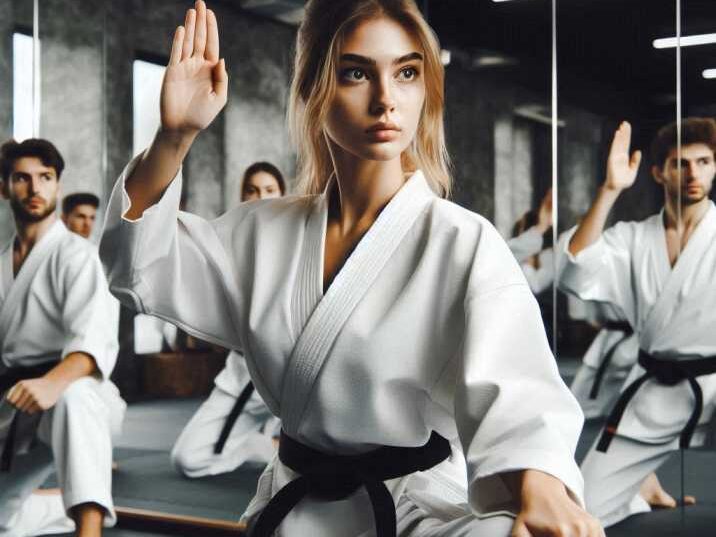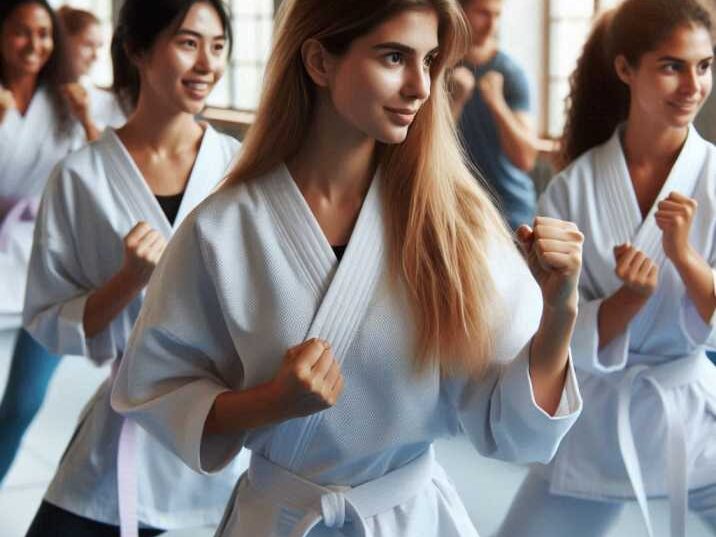Introduction
Table of Contents
Have you ever thought about how martial arts can change women’s lives? For many, martial arts may look like something for action movies or professional fighters. In reality, it is a powerful skill that every woman can benefit from.
In the United States, women face challenges related to safety, health, and confidence. Parents often look for activities that can help their daughters grow stronger both inside and out. Martial arts is one of the best answers.
This article explains why women should learn martial arts, how it supports personal growth, and what parents should know before enrolling their daughters. You will find benefits, risks, safety tips, and clear answers to common questions.

What Martial Arts Means for Women
Martial arts are systems of training for self-defense, fitness, and discipline. They include styles such as karate, taekwondo, judo, Brazilian jiu-jitsu, and kickboxing. Martial arts for Women is not just about learning to punch or kick. It is about:
Building confidence in daily life
Martial arts teaches women how to stay calm and in control in different situations. When you learn to defend yourself, you naturally feel more secure. Confidence grows with every new skill or belt achieved. This self-belief carries into school, work, and personal life.
Developing strength and fitness
Training in martial arts works the whole body. Women gain stronger muscles, better flexibility, and improved stamina. Unlike gym workouts, martial arts keeps exercise fun and skill-based. The physical benefits also support long-term health and energy.
Learning how to protect themselves
One of the biggest reasons women train in martial arts is self-defense. Techniques focus on escaping holds, blocking strikes, and staying safe. Women learn to face real-world threats with practical skills. This knowledge provides peace of mind in daily life.
Creating discipline and focus
Martial arts require regular practice, patience, and respect for instructors. These habits build strong discipline over time. Women also improve focus by concentrating on techniques and forms. This mental sharpness helps in academics, careers, and personal goals.
Unlike other sports, martial arts combines physical, mental, and emotional growth, which makes it unique.
Benefits of Martial Arts for Women
Here are the top benefits women gain from practicing martial arts:
Self-Defense Skills
Training in Martial arts equips women with techniques to escape from grabs, pushes, or sudden attacks. Styles like Brazilian jiu-jitsu and judo are especially effective against bigger opponents because they use leverage instead of strength. Knowing how to defend themselves reduces fear and increases awareness. This confidence helps women feel safer when walking alone or in crowded public spaces.
Physical Fitness
Training in martial arts is a complete workout for the entire body. It builds strength through kicks and punches, flexibility through stretching, and endurance through drills. Women improve balance, coordination, and core stability as well. Regular practice also helps with weight management and overall health.
Mental Health and Stress Relief
Martial arts is not only physical, it also supports mental well-being. Training in martial arts sessions provide a healthy way to release tension and reduce stress. Exercise boosts mood naturally by releasing endorphins. The focus on breathing, movement, and technique feels similar to mindfulness, calming the mind.
Confidence and Empowerment
Progress in martial arts is measured through belts, sparring, and skill mastery. Each achievement gives women a sense of accomplishment and personal growth. Facing challenges on the mat builds resilience and self-worth. This empowerment carries into school, work, and personal relationships, strengthening overall confidence.
Discipline and Life Skills
Training in Martial arts emphasizes respect for teachers, peers, and oneself. Students must focus on learning techniques, practicing regularly, and showing consistency. These habits create discipline that extends beyond the dojo. Women often apply these skills in academics, careers, and family responsibilities, making them more organized and determined.
Possible Risks or Concerns
Injury Risk
Like any sport, Training in martial arts carries a chance of minor injuries such as sprains, bruises, or muscle strains. These often happen during sparring or intense training. With proper warm-ups and safety gear, most injuries can be avoided. Serious injuries are rare when schools follow safety rules.
Time Commitment
Martial arts requires consistent practice to see progress. Regular classes, usually two to three times a week, can feel like a big commitment for busy families. Missing classes may slow improvement, so scheduling is important. Parents should consider how training fits into school and home life.
Cost
Parents should be aware of the expenses involved in martial arts. Monthly class fees, uniforms, belts, and protective gear can add up. Some schools may also charge for belt testing or competitions. Planning a budget in advance helps avoid financial stress.
Physical Challenge
Martial arts can be demanding, especially in the beginning. Students may feel sore after training or struggle with stamina. Some styles, like taekwondo or judo, require more physical effort than others. With time and regular practice, the body adapts and becomes stronger.
Safety Tips and Best Practices
Start with Beginner Classes Led by Certified Instructors
Beginners should train under instructors who are certified and experienced in teaching women and children. Qualified teachers know how to break down techniques safely. They also focus on building basics before moving to advanced moves. This creates a strong and safe foundation.
Use Proper Safety Gear
Protective gear is essential for safe training. Gloves, shin guards, and mouthguards reduce the risk of injuries during sparring. Headgear or padded mats may also be used in certain styles. Investing in quality gear ensures both safety and comfort.
Warm Up and Stretch Before Training
Warming up prepares the body for physical activity and lowers the chance of injuries. Stretching improves flexibility and helps avoid muscle pulls. Even a few minutes of light jogging or dynamic stretches make a big difference. This habit should be part of every training session.
Choose Schools That Focus on Respect and Safety
Not all martial arts schools have the same training culture. Parents should look for schools that value respect, discipline, and student safety. Avoid schools that push students too hard or focus only on competition. A positive environment helps women and girls feel comfortable learning.
Parents Should Monitor Progress and Encourage Rest
Parents play a key role in supporting their daughters. Checking in on progress, talking with instructors, and encouraging rest after tough sessions helps keep training healthy. Rest days allow the body to recover and prevent burnout. Balanced support ensures long-term success.
Comparison with Other Activities
Martial arts offers benefits similar to yoga, dance, or team sports, but with extra advantages:
Unlike Yoga, Martial Arts Teaches Self-Defense
Yoga is excellent for flexibility, stress relief, and body awareness, but it does not prepare someone for real-life threats. Martial arts adds the important layer of self-defense. Women learn how to block, escape, and protect themselves in unsafe situations. This makes martial arts both a fitness activity and a safety tool.
Unlike Team Sports, Martial Arts Focuses on Individual Growth
Team sports build teamwork and group coordination, but progress often depends on the whole team. Martial arts emphasizes personal improvement, where each student moves at their own pace. Women set individual goals, like earning new belts or mastering techniques. This creates a stronger sense of ownership over their achievements.
Unlike Dance, Martial Arts Builds Practical Skills for Safety
Dance helps with rhythm, balance, and self-expression, but it does not offer protection in real-world situations. Martial arts combines movement with practical defense skills. Women gain the same coordination and body control as in dance, but with added safety benefits. This dual purpose makes martial arts more versatile for everyday life.
This makes martial arts a well-rounded option for women of all ages.

Table: Benefits vs. Risks
| Benefits of Martial Arts for Women | Possible Risks or Concerns |
|---|---|
| Self-defense skills for safety | Minor injuries like bruises |
| Improves strength and fitness | Time commitment required |
| Boosts mental health and focus | Costs for gear and classes |
| Builds confidence and empowerment | Physical demands at start |
| Teaches discipline and respect | Need for safe instructors |
Conclusion
Martial arts gives women tools to protect themselves, build fitness, and grow confidence. Parents can encourage their daughters to explore it as a lifelong skill. While risks exist, safe training and supportive instructors make it a powerful and positive activity.
If you are a parent looking for an empowering activity for your daughter, martial arts may be the best choice. It teaches strength, safety, and discipline that last a lifetime.
FAQs
1. What is the best martial art for women to learn?
Brazilian jiu-jitsu and karate are often recommended because they teach real-life defense skills and improve fitness.
2. Can women start martial arts at any age?
Yes. Many women start in their 20s, 30s, or even later. Martial arts schools welcome beginners of all ages.
3. Is martial arts safe for girls?
Yes, when trained under certified instructors with safety gear, martial arts is as safe as other sports.
4. How often should women practice martial arts?
Two to three times a week is enough to see progress without risking overtraining.
5. Do women need to be strong before starting martial arts?
No. Strength and fitness improve naturally with regular practice.


